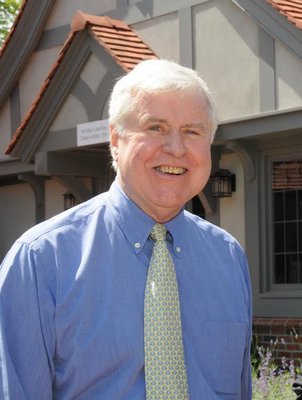
East Hampton Library’s “Tom Twomey Series: Conversations With ...” returns Saturday, April 16, for a second season of presentations in memory of the former chairman of the library’s board of managers, who died in 2014 as he was about to inaugurate a series of lectures on issues and ideas of worldwide importance that are of particular significance on the East End.
It was Tom Twomey’s hope that those who attend the lectures will be moved to pursue the topics by consulting the unique materials in the library’s Long Island Collection. The multi-discipline series, which covers entertainment, politics, health, energy, history, the environment, culture and the arts, reflects Mr. Twomey’s broad and deep interests as a socially active civic leader, lawyer and archivist who edited a number of handsome illustrated volumes on local history.
The series was for Mr. Twomey a natural extension of his passion for research and his desire to make that research widely available and easily accessible.
The talks, which are free, take place in the library’s attractive new Baldwin Family Lecture Room and will be archived online.
The conversations begin with Frank Sorrentino and Steve Russell Boerner talking about “Colonial Commerce,” a subject dear to the heart of Mr. Twomey, who was bowled over by a presentation he had attended on Mr. Sorrentino’s colonial coin collection. Though the subject may sound academic, it will be anything but. As East Hampton Library director Dennis Fabiszak pointed out, “We all know we live in a place with history, but this lecture makes it absolutely clear how much local history is tied to our country.” The colonial era account books in the Long Island Collection, which Mr. Sorrentino has been transcribing with Mr. Boerner’s digital savvy, show who was in business with whom, doing what and where in the 18th century prior to, during and directly after the Revolutionary War.
“History not only occurred here,” Mr. Fabiszak emphasized, “it’s confirmed here for the first time with these materials,” validating the extensive work done decades earlier by Long Island enthusiast, collector and East Hampton Town and Suffolk County historian Morton Pennypacker.
The account books also help identify the participants in General George Washington’s Culper Spy Ring, which he set in motion to gather information on British troops, equipment and military plans. Central to the success of the ring was Robert Townsend (1753-1838), known as Samuel Culper Jr. and also “723,” who uncovered a plot by the British to ruin the colonial economy by flooding the market with counterfeit dollars, an eye-opener that proves the truth of the old saw: “follow the money.”
Mr. Sorrentino, a retired insurance executive who developed expertise in colonial currencies and old bookkeeping practices, is an indefatigable worker who has been engaged with the project for five years. He kept finding so many colonial terms about money that the project swelled to include a glossary. Mr. Boerner, an archivist who is digitizing Mr. Sorrentino’s transcriptions and is a specialist in land surveying and cartography, noted that the project also involves plotting a customized map online that will indicate how merchants, individuals and businesses conducted affairs locally and internationally at a time before central banking. American textbooks typically played down the East End’s importance to the Revolution, compared to New England, Mr. Fabiszak pointed out. No more.
On Saturday, May 7, Christopher J. Gobler, Ph.D., the director of the Gobler Lab at Stony Brook University’s School of Marine and Atmospheric Sciences, will speak on “The Pond Scourge,” i.e. algal blooms. On Saturday, May 21, “Harps, Harmonicas and Heavy Breathers: A History of the People’s Instrument” will feature live music with author/performers Kim Field and Randy Weinstein. The Saturday, June 4, speaker will be New York Times national political correspondent Patrick Healy talking about “Campaign Theatrics,” which is “arguably the hottest topic in the series,” Mr. Fabiszak said. On Saturday, June 25, New York Times senior writer Elisabeth L. Rosenthal, M.D., and Robert S. Chaloner, the president and CEO of Southampton Hospital, will address “The Cost of Health Care.”
During July and August, the lectures move to Thursdays. On July 21, Alabama born Bridgehampton architect and columnist Preston T. Phillips, whose bold designs on the East End have landed him on prestigious architectural magazine covers, talks on what he calls “Hampturbia in the Age of Escalade Entitlement.” Then on August 25, Scott Cowen, a president emeritus of Tulane University, and East Hampton Town Supervisor Larry Cantwell will lead a discussion on “Lessons from Katrina: Preparing the Next Big One.”
Saturday, September 10, Susan L. Solomon, the CEO and co-founder of The New York Stem Cell Foundation, will talk about “Frontiers in Stem Cell Research: What’s New.” On Saturday, October 15, concluding the series, Ed Faszczewski, who lived with his family on Plum Island in the late ’50s, will regale listeners with “Life on Mystery Island: Adventures on Plum Island.” This last lecture, Mr. Fabiszak noted, is partially funded through Mr. Twomey’s will.
LTV will record the lectures for broadcast and make them available to stream at ltveh.org, and Mr. Fabiszak hopes to offer them to schools.
Though free, reservations are required and can be made at the adult programs desk in the library, by calling (631) 324-0222, extension 3, or emailing reference@easthamptonlibrary.org. Saturday lectures begin at 5 p.m. Thursday lectures begun at 6 p.m.